NEW DELHI—Waste Disposal Driver DD Sil spends his days burdened by the often grueling job of transporting garbage from New Delhi’s streets. Before the Coronavirus, all the waste, tossed in bins around the city, looked the same; black plastic bags, bulging with rotten food and discarded cardboard boxes. It was a dirty job, but not a dangerous one. Now Sil wonders about his safety every day. Though by law, citizens are instructed not to toss masks, gloves and other COVID-19 related waste onto the city’s streets, Sil and his colleagues often find masks and gloves in the black bags of garbage they are transporting.
Sil admitted that this potentially hazardous waste ends up in the landfill unsegregated and said that he and other drivers have pleaded with their superiors and fellow citizens alike to stop putting their lives at risk, but to no avail. “We are seriously worried about our well-being,” said Sil.
During this global pandemic, thousands of minimum-wage workers are now forced to choose between feeding their families and risking their lives.
“I live in garbage,” said Sudhir. One of the many workers tasked with picking up and sorting through garbage from the streets of New Delhi, he is not meant to be segregating biomedical waste. However, according to Sudhir, he and his co-workers find a lot of coronavirus related debris such as masks, gloves and Personal Protective Equipment (PPE) in the garbage bins they have to sort through. These workers have no way of knowing if the waste they are dealing with was generated by COVID-19 positive citizens and are defenseless against the dangers it may pose. “We aren’t given any masks, gloves or even shoes to protect ourselves,” said Sudhir.
Digging into his pocket, he pulled out a mask covered in filth and said, “All I have is this dirty mask which will make me even sicker if I wear it. The only time I put it on is when I see the police because if I don’t, I will be fined 500 rupees and I only make 200 rupees a day.” Despite the danger to his life, he has not been paid in months and is now worried about providing for his wife and children.
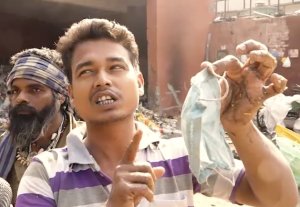
Sudhir and Sil are but two of the thousands of minimum-wage workers in New Delhi that have been pushed onto the front lines of a global pandemic. Due to the city’s mismanagement of biomedical waste, it is now facing a waste disposal crisis that has troubling implications for its citizens’ health. According to Dr. Sanjeev Singh, the chief medical superintendent at Amrita Hospital, “If biomedical waste is not disposed of properly, it could be extremely infectious and hazardous for the city’s communities.”
As per state regulations, COVID-19 related waste such as masks, gloves and PPE is treated as hazardous biomedical waste. This waste is meant to be recycled by the city’s waste disposal plants before sent to one of New Delhi’s two landfills. The state government has put into place several regulations intended to ensure that this waste disposal procedure is followed at both an industrial and local level.
However, outside the Sat Nagar crematorium in Karol Bagh, New Delhi, lay piles of abandoned PPE and masks. Used by relatives of the deceased and crematorium staff, disposal of this hazardous waste had been left to the crematorium’s minimum-wage workers. They, like Sudhir, have little choice but to do a life-threatening job.
As part of the government’s efforts to tackle the coronavirus’s spread in local communities, special waste disposal trucks have been designated to collect yellow bags of biomedical waste from COVID-19 positive households. These trucks are meant to distinguish the disposal of coronavirus related waste from the generalized disposal system for private residences. However, in addition to placing waste that has come in contact with coronavirus positive individuals in a yellow bag, COVID-19 positive households are told to maintain their pre-pandemic system of waste disposal for uncontaminated waste, leaving black bags outside their homes for general pickup.
Dinesh Raj Bandella, the deputy program manager of the environmental governments’ team at the Center for Science and Environment, said that this disposal system has generated confusion among citizens, resulting in a lack of execution of government regulations. Alongside a team of others from the Center for Science and Environment, Bandella has been researching waste management during the pandemic.
As part of a research project, he visited nine coronavirus positive homes to assess if COVID-19 related waste disposal. He found that instead of segregating the waste, all households were placing most of it in black bags for regular collection. This method of separation failed to meet the state government’s instructions on bio-waste. Bandella said that in his conversations with these families, it became clear that they were uncertain how to segregate the waste they were generating between black and yellow bags, indicating a lapse in communication between the government and its citizens.
According to Bandella, the consequences of improper segregation at the household level are dangerous. “Once the waste reaches the dumpsite, it’s pretty difficult to differentiate between a COVID-19 positive household or general use masks,” Bandella said. Explaining the gravity of the situation, he said that because the waste in these black bags goes to a dumpsite without treatment, “there are a lot of chances that the waste that ends up in a dumpsite might be from COVID-19 positive households.”
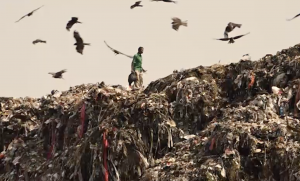
DD Sil, a waste disposal truck driver, is all too familiar with the problem Bandella is describing. Though Sil is meant to be carrying general waste directly to the Ghazipur landfill, he and his colleagues often find masks and gloves in the black bags they are transporting. Sil admitted that this waste ends up in the landfill unsegregated and said that he and other drivers have pleaded with their superiors and fellow citizens alike to stop putting their lives at risk, but to no avail. “We are seriously worried about our well-being,” said Sil.
In addition to the improper execution of government regulations, local businesses and households, often fail to comply with regulations at an institutional level. Biomedical waste generated in hospitals, which now includes coronavirus related waste, is meant to be collected from hospitals by one of the city’s two biomedical waste disposal companies, SMS Water Grace and BioSolutions. It is then taken to their facilities to be recycled before it ends up in the city’s ever-growing landfills, much like waste generated at the local level.
However, on July 10, 2020, the city’s two functional biomedical waste disposal plants were at 90% capacity. According to Dr. Ashok K. Agarwal of the International Institute of Health Management Research, these facilities are “now working outside of their capacity,” and under duress because they cannot manage the increased amount of waste generated during the pandemic. “Most of the waste they get is in the form of PPE kits, masks and gloves and they are under a lot of pressure trying to manage it all,” said Dr. Agarwal.
Dr. Singh affirmed Dr. Agarwal’s fears. He said that while biomedical waste disposal has always been an issue for New Delhi, during the pandemic, the two biomedical waste disposal plants currently in use are not adequate to cater to the city’s 88 hospitals. He also said that hospitals do not know if the waste they are sending to these facilities is disposed of properly.
Each hospital management team member is meant to visit the waste disposal plants every month to ensure that government guidelines are being followed. However, in the amid a global pandemic, these visits have been neglected entirely. “We presume they are adhering to norms, but we also know that the total tonnage of biohazardous waste has increased three times over. We don’t know that they have the capacity, but assume that they do,” said Dr. Singh.
He also explained that the issue goes deeper than disposal of this waste at the plants themselves, with complications arising during the transferring the waste from hospitals to biomedical waste facilities. Dr. Singh said that waste disposal costs are incurred based on occupied beds and are typically in the range of six to eight rupees per occupied bed. Recently, however, waste disposal facilities have been increasing their price per bed, leading to a standstill between hospitals and the waste disposal companies. This conflict creates a situation where waste is not disposed of until payment is resolved, instead of every 24 hours as per state regulation.
Additionally, biomedical waste disposal plants are not the sole party responsible for New Delhi’s current waste disposal predicament. Waste meant to be transported directly from hospitals to biomedical waste plants can be found lying on streets outside the hospitals.
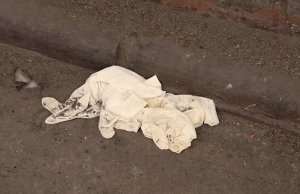
At New Delhi’s GB Pant Hospital, doctors and nurses claimed waste management was not an issue. However, lying just outside the hospital were used gloves, masks and other COVID-19 related waste, mixed in with garbage. With hospitals such as GB Pant dumping bags of biomedical waste onto the streets, the institutions in place meant to keep citizens safe are being questioned.
Violations of government directives are visible not just outside hospital walls but also inside them. As per the health and safety guidelines set forth by the New Delhi state government, hospitals are not permitted to leave waste generated in their facilities in publicly accessible areas. Nonetheless, at Lok Nayak Jai Prakash Narayan Hospital, staff rolled out bins of waste from inside the building, only to leave them in open, public areas where many patients bide time as they wait to be treated. These bins, which remained outside the hospital for several hours, are yet another example of defiance of state laws, which, without enforcement, fail to be effective.
In the past nine months, over 129 thousand people have died of COVID-19 in India. As a country, India has counted 8.73 million cases, a number that is continually increasing. As we get deeper into the pandemic, the systems in place responsible for handling the disposal of coronavirus related waste are becoming taxed. This is expanding the risk, especially for minimum-wage workers. With no immediate solution in sight, this issue could very well get worse before it gets better, leaving us to wonder how many pleas such as those of Sil and Sudhir are going unheard.

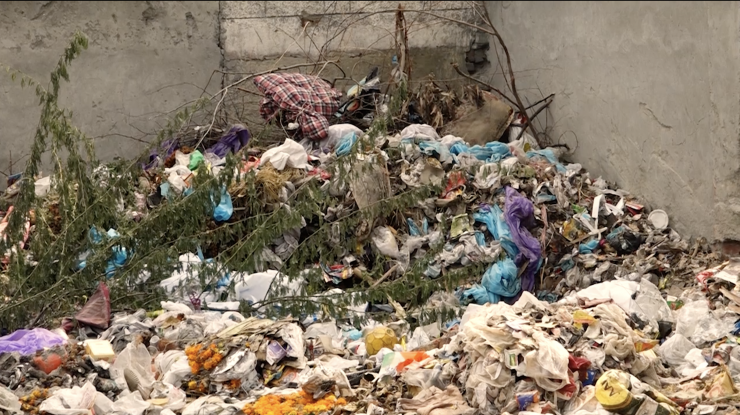
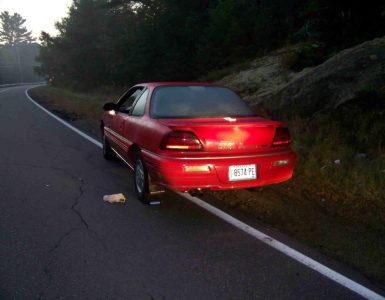


Add comment